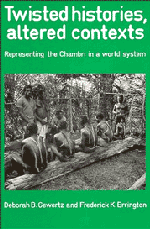Book contents
- Frontmatter
- Contents
- List of illustrations
- Acknowledgements
- Introduction: On writing the Chambri
- 1 The new traditionalism: tourism and its transformations
- 2 The initiation: making men in 1987
- 3 The town
- 4 Western representations at home
- 5 The written word
- 6 Negotiating with the state
- Conclusion: Interlocking stories, intersecting lives
- Appendix A: Godfried Kolly's life story
- Notes
- References
- Index
5 - The written word
Published online by Cambridge University Press: 05 June 2012
- Frontmatter
- Contents
- List of illustrations
- Acknowledgements
- Introduction: On writing the Chambri
- 1 The new traditionalism: tourism and its transformations
- 2 The initiation: making men in 1987
- 3 The town
- 4 Western representations at home
- 5 The written word
- 6 Negotiating with the state
- Conclusion: Interlocking stories, intersecting lives
- Appendix A: Godfried Kolly's life story
- Notes
- References
- Index
Summary
Many of the Western representations concerning development were conveyed to those at Chambri in newspapers, magazines, and religious literature. They were compelling, in part, because they appeared in written form. As such, these representations could be readily consulted and discussed. Moreover, they were imbued with appreciable intrinsic authority because writing was itself the mark and the means of development. The ability to read and write, at least in Pidgin English if not in English, had in fact become for the Chambri (and for many other Papua New Guineans) a fundamental component of development.
Indeed, literacy was a national priority, one of the central objectives of the nationally determined school system, for it was regarded as essential to the development of a united and effective Papua New Guinea state. Only if Papua New Guineans were generally literate, it was thought, could they develop a common national culture that would unify them. (Government policy accorded with Anderson's [1983] perception that it was through common cultural experiences acquired from such media as nationally circulated newspapers that peoples were able to perceive of themselves as a citizenry.) And, only with the support of a relatively united public – a citizenry – could the Papua New Guinea government hope to operate as a modern state, a modern state that could exercise authority sufficient to formulate and implement national policy. Literacy thus would enable the state to represent Papua New Guineans in a double sense, that of speaking for and to them.
- Type
- Chapter
- Information
- Twisted Histories, Altered ContextsRepresenting the Chambri in the World System, pp. 147 - 168Publisher: Cambridge University PressPrint publication year: 1991



